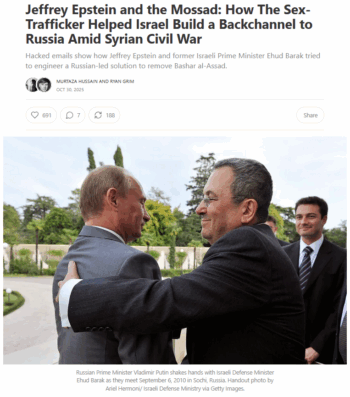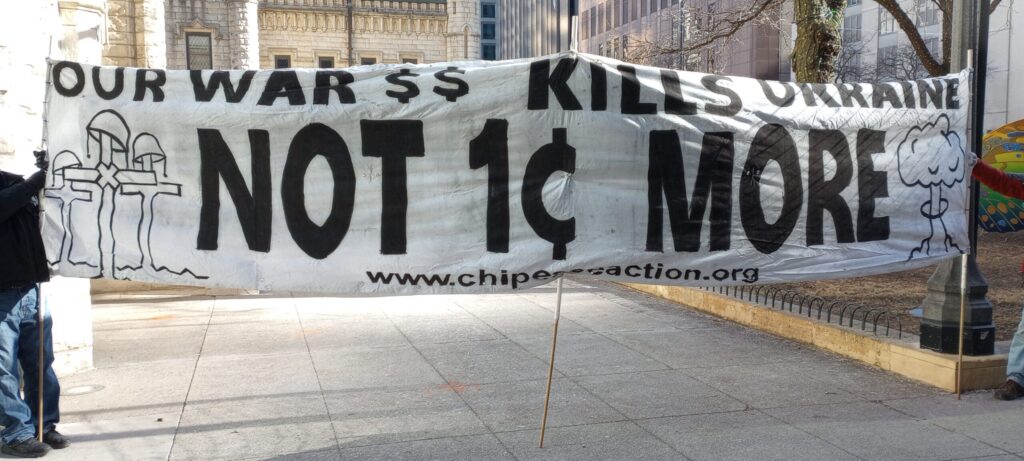For years, there have been whispers that convicted sex offender Jeffrey Epstein, who had ties to key officials in the US and foreign governments, was involved with Israel’s intelligence agency, Mossad.
However, the Epstein/Mossad ties were often labeled by US corporate media as “unfounded” (New York Times, 8/24/25), dismissed as a “conspiracy theory” (New York Times, 7/16/25), or said to have been “largely manufactured by paranoiacs and attention seekers and credulous believers” (New York Times, 9/9/25). Former Israeli Prime Minister Naftali Bennett has claimed that “Epstein’s conduct, both the criminal and the merely despicable, had nothing whatsoever to do with the Mossad or the State of Israel.”
It’s true that far-right antisemites like Candace Owens and Tucker Carlson have promoted a conspiratorial version of the Epstein/Israel connection as part of their bigoted, attention-seeking narratives. But recent investigations by Drop Site News—the nonprofit investigative outlet founded in July 2024—into a major hack targeting Israel revealed that Epstein did play a significant role in brokering multiple deals for Israeli intelligence. Despite the hack’s significant revelations, US corporate media coverage remains scant.
‘Knack for steering the superpowers’

Drop Site (10/30/25): “Epstein was an invaluable resource for Israel’s former prime minister [Ehud Barak]…even advising him on how to engage with the Mossad.”
Since 2024, a hacking group called “Handala” with reported ties to the Iranian government (Committee to Protect Journalists,
7/9/25) has carried out a series of cyberattacks targeting Israeli government officials and facilities (
Press TV,
12/1/24;
CyberDaily,
6/16/25).
Aspects of the Handala hack were published on the website of nonprofit whistleblower Distributed Denial of Secrets (DDoS), including hundreds of thousands of emails from former Israeli Prime Minister Ehud Barak, one of Epstein’s closest connections.
Since the hacked information was released, numerous independent media outlets—including Reason (8/27/25), All-Source Intelligence (9/17/25, 9/29/25, 10/13/25), Grayzone (10/6/25, 10/9/25, 10/13/25), the (b)(7)(D) (10/16/25, 10/21/25) and DeClassified UK (9/1/25, 11/3/25)—have published investigations on its contents. Among the independent media outlets, Drop Site’s coverage stands out for its in-depth research and broad scope.
Drop Site’s investigations into the Handala hack have included six major stories since late September, four of which have centered around “Epstein’s work on behalf of Israeli military interests, particularly as it relates to his role in the development of Israel’s cyber warfare industry.”
Drop Site reporters Murtaza Hussain and Ryan Grim (9/28/25) detailed how Epstein wielded his influence to expand Israel’s cyber warfare industry into Mongolia. Drop Site wrote:
Jeffrey Epstein…exploited his network of political and financial elites to help Barak, and ultimately the Israeli government itself, to increase the penetration of Israel’s spy-tech firms into foreign countries.
In their next piece, Drop Site revealed (10/30/25) that Epstein created an Israel/Russia backchannel to attempt to oust Syrian President Bashar al-Assad. Hussain and Grim reported that Epstein also worked with Barak and Russian elites to pressure the Obama administration into approving strikes on Iran, demonstrating his “knack for steering the superpowers toward Israel’s interests by leveraging a social network that intersected the Israeli, American and Russian intelligence communities.”
In the same piece, Hussain and Grim quoted Epstein asking Barak to “wait until they could speak privately before Barak notified intelligence leaders of a deal” with Russian-Israeli oligarch Viktor Vekselberg, and to “not go to number 1 too quickly.” Number 1 has long been a nickname for the head of the Mossad, DropSite noted.
Another article (11/7/25) recounted that Epstein sold surveillance technology to Côte d’Ivoire: “Epstein helped Barak deliver a proposal for mass surveillance of Ivorian phone and internet communications, crafted by former Israeli intelligence officials.”
Most recently, Grim and Hussain (11/11/25) reported that an Israeli spy regularly stayed at Epstein’s Manhattan apartment. The spy, Yoni Koren, “made his intelligence career working in covert operations alongside the Mossad.”
Failing to cover the Handala hack

The New York Post (8/31/25) had no problem using Handala info to document Epstein’s ties to a disgraced British royal.
Hacked information must be handled ethically by journalists—including by verifying the files, considering public interest, concealing identities when necessary, and noting its origins. This is what Drop Site has done. And its reporting has significant public interest, revealing the ways in which Epstein served Israel’s interests.
Yet in a search of ProQuest’s US Newsstream collection for “Handala,” as well as a supplementary Google search, the only US corporate media outlet found to have covered the Handala hack is the New York Post (8/31/25). Its single 700-word story, drawing from Reason (8/27/25) and the Times of London (8/30/25), focused on how Prince Andrew stayed in contact with Epstein for five years longer than previously stated—sidestepping the revelations from Drop Site about Epstein’s ties to Mossad.
Hussain, who had not seen the New York Post story, said US corporate media is “deliberately ignoring” the story:
It’s such a goldmine of stories. They’re not going through it, they don’t want to talk about it. I think it’s very difficult for them to conceive what these emails refer to because they’ve spent so much time talking about it as a conspiracy theory. And now contravening evidence is emerging, or well-substantiated evidence, showing that it’s really not a conspiracy theory.
Indeed, recent mentions of Epstein’s ties to Israeli government officials have continued to dismiss them as conspiracy theories, ignoring the hack and Drop Site‘s work. For instance, an LA Times op-ed (10/10/25) on antisemitism in the GOP listed Tucker Carlson’s suggestion that “Epstein was a Mossad agent” (and accusing Israel of “genocide” in Gaza) as evidence of “appalling behavior,” alongside things like “entertaining Hitler/Nazi apologia” and suggesting that “Jews had something to do with [Charlie] Kirk’s death.”

The New Yorker (10/10/25) suggested that drawing a connection between “the war in Gaza” and “fealty to Israel” is part of a “dark alternative view of the world.”
The New Yorker’s Jay Caspian Kang (10/10/25) asserted in his weekly column:
On Planet Epstein, everything that happens—the assassination of Charlie Kirk, the war in Gaza, the suppression of speech by the Trump Administration—proves the country is run by blackmail, pedophilia and fealty to Israel.
While it is of course absurd to blame “everything” on Epstein or Israel—and right-wing conspiracy theories that incorporate antisemitism are very real and dangerous—is it really unreasonable to blame “the war in Gaza” on too much “fealty to Israel”? After all, from October 7, 2023 to September 2025, the US sent $21.7 billion in military aid to Israel, according to Brown University’s Costs of War project—more than a quarter of Israel’s total post–October 7 military expenditures. Epstein’s evident connections to Mossad do raise the question of whether there is more to that “fealty” than the $100 million the pro-Israel lobbying group AIPAC spent on both parties during the 2024 election cycle (Common Dreams, 8/28/24).
By using the “conspiracy theory” frame, Kang not only overlooked the recently revealed files from Drop Site, but also failed to convey the full scope of Epstein’s influence, leaving the actions of associates and key government officials unscrutinized.
Other Handala revelations

All Source Intelligence (9/17/25) published a story based on the Handala leak documenting a Canadian billionaire couple’s support for an Israeli program to sabotage critics online.
Other aspects of the Handala hack have also been well-covered by independent media, including reports of billionaires funding an Israeli cyber campaign against anti-apartheid activists (All-Source Intelligence, 9/17/25). Other stories describe Iran striking a secret Israeli military site near a Tel Aviv tower (All-Source Intelligence, 10/13/25; Grayzone, 10/13/25), and Larry Ellison’s son, David Ellison, meeting with a top Israeli general to plan spying on Americans (Grayzone, 10/6/25). The Grayzone (10/9/25) also reported that a former US ambassador secretly worked with a top Israeli diplomat to help Israel access several prestigious UN committees.
In Israeli media, Haaretz (3/9/25) reported that thousands of Israeli gun owners were exposed in an Iranian hack-and-leak operation. The paper (7/9/25) also revealed the leak of a database containing thousands of résumés belonging to Israelis who served in classified and sensitive positions within the Israel Defense Forces and other military and security agencies.
These details, like those about Epstein, have also been met with silence in US corporate media.
There has been wall-to-wall US corporate media coverage of the Department of Justice’s Epstein files and the battle over its release. So why has the hack largely been ignored by US corporate media? One possible reason is the hack’s likely origin. It has been reportedly attributed to Banished Kitten, a cyber unit within Iran’s Ministry of Intelligence (Committee to Protect Journalists, 7/9/25). Hacks purportedly emanating from Iran are rarely covered in US corporate media—and when they are, the origin of the hack, not its content, becomes the focus.

Corporate media have long shown a double standard on when it is and is not permissible to publish information obtained through hacking (FAIR.org, 11/24/09, 9/30/24).
Look no further than media coverage of the 271-page official dossier of then–Republican vice presidential candidate J.D. Vance, which revealed that the Trump campaign believed Vance “embraced noninterventionism,” among other purported vulnerabilities (Ken Klippenstein, 9/26/24). The US government alleged the Vance dossier was leaked through Iranian hacking (FAIR.org, 9/30/24). While the New York Times, Washington Post and Politico possessed the Vance dossier for weeks, they declined to publish it (Popular Information, 9/9/24).
The contents of the Vance dossier were eventually revealed by independent reporter Ken Klippenstein, as well-documented by FAIR contributor Ari Paul (9/30/24). Paul noted that while Klippenstein’s reporting pushed the story into the legacy media, “most of the reporting about this dossier has been on the intrigue revolving around Iranian hacking rather than the content itself” (Daily Beast, 8/10/24; Politico, 8/10/24; Forbes, 8/11/24).
Today, despite Drop Site‘s thorough and revealing reporting, the Handala hack has been almost completely ignored by US corporate media. Said Drop Site‘s Hussain:
A lot of these [media] organizations, it’s kind of not a secret, they have sympathies or ties to Israel, so it’s not a story which is appealing to them, it’s not politically convenient for these organizations, for the most part.
I think when something’s in the public interest, you report on it, and you’re transparent about where it came from. But in this case, [US corporate] media chose not to.
This post was originally published on FAIR.











